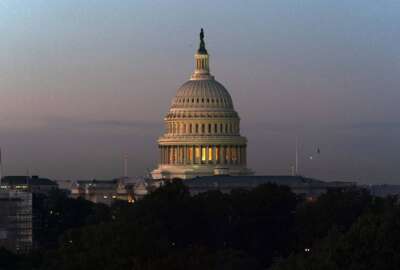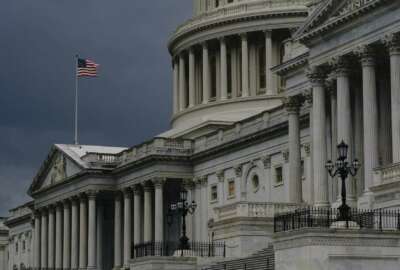
Congress steps off the government shutdown cliff. So now what?
Congress managed to get that continuing resolution passed. It lasts until December 16.
Best listening experience is on Chrome, Firefox or Safari. Subscribe to Federal Drive’s daily audio interviews on Apple Podcasts or PodcastOne.
You are at work today. That’s the good news. It went down to the wire, but Congress managed to get that continuing resolution passed. It lasts until December 16. And for what comes after that, and in the meantime, The Federal Drive with Tom Temin turned to Bloomberg Government Congress reporter Jack Fitzpatrick.
Interview transcript:
Tom Temin: And Jack, I guess they went to the deadline. Tell us more about that CR and what else Congress is going to be up to?
Jack Fitzpatrick: Yes, unsurprisingly, Congress waited until almost the last minute to fund the government, they have a tendency to do that. But it never really seemed like anybody was going to sincerely shut down. As soon as they got agreement to pull Joe Manchin’s energy permitting bill from this stop gap. Maybe tried to do that on something else, it looked like they had a good path forward to fund the government. So this goes through December 16, there will be an attempt to do a lame duck deal on a full government funding omnibus bill between now and then. The first thing they have to do to accomplish that is get a bipartisan, bicameral agreement on what the basic numbers are going to be. They need to settle the just generally what’s the number going to be on defense and non defense discretionary spending, and they will probably try to pair that with some sort of broad agreement on are we going to allow a bunch of policy riders or not. Once they get the general framework, they can move pretty quickly to put together an omnibus, but that will be the big challenge. Republicans want a big increase for defense. And for many years, they’ve talked about, well, you increase defense, you get Republican votes, you increase non-defense, you get Democratic votes, Republicans are trying to make a push to say this should not be parody. They should increase it more for defense than non-defense. We’ll see how that goes. But that’s going to be a conversation over the next few weeks while they’re gone, is conversations among the top appropriators to see if they can get a general framework that would then enable a real funding deal.
Tom Temin: Right. And there is some pressure on the military that is trying to help out Ukraine. And you know, the latest delivery under that funding to Ukraine may not be available for a couple of years, three, four years, the actual equipment. That’s what the Pentagon says, and therefore, they might have to draw down U.S. stocks. Nobody knows how that’s gonna play out yet. But could that be a factor in those negotiations?
Jack Fitzpatrick: That is definitely a factor in the talks, the attempts and the need to refill the U.S. military stocks, because they have relied on their own material to aid Ukraine, because that’s much faster. And because the U.S. is not itself actively at war with anybody, but obviously, the military, even former people, Mark Esper, the Trump administration’s defense secretary was telling a colleague of mine, that you need to act very quickly to increase U.S. defense spending in order to gradually refill your weapons, ammunition other material, because it is a slow process. The federal government does not move extremely fast. So there is a push right now to say we need a bigger than usual defense funding increase, partly because of the aid to Ukraine, that has added up to a lot, but also just because of inflation. If you’re going to try to get the conversation now as a 4.6%, pay raise for members of the military, if you’re gonna try to do that and also increase their capabilities. And you’re looking at a much higher percentage inflation, depending on what month you’re looking at high rates of inflation lately, you don’t want to decrease the military’s purchasing power. So those are two main factors that are leading Republicans to push very hard for big defense numbers. Democrats have indicated some willingness to go there. The question is, do they also then get a corresponding increase for other agencies as well?
Tom Temin: Right, I guess the arsenal of democracy can be a little creaky at times. We’re speaking with Jack Fitzpatrick. He’s Congress reporter for Bloomberg Government. And what about the factor of, as you mentioned, this negotiation will take place in the lame duck. But what if there is a switch in party dominance in one or both of the chambers that will be coming after these negotiations? How could that affect it?
Jack Fitzpatrick: That will clearly have some effect. They’re going to look at the results of the election and try to get a deal before the next Congress just because there’s no reason to wait. No particular reason. But obviously, if Republicans take at least the House, if not also the Senate, they’re going to feel bolstered in the demands that they’re making. Now, there is a group of Republicans, the Freedom Caucus and other conservatives who have said we shouldn’t have this stopgap to December we should just kick it to the next Congress when we assume we will have at least the House on the Republican side. And when we have more votes, we should vote then on a funding deal. The appropriators and the maybe more compromise-minded Republicans have said, Look, you’re going to need a Democrat’s signature in the White House, you’re going to need 60 votes in the Senate, it’s not going to make that much of a difference. We might as well try to get this done in December. And if you want to sort of factor the results of the election into those negotiations, you can and if you don’t get a good deal, you can always wait. So it seems there are enough Republicans interested in getting a December deal so that it is possible they could come together and find something to get 60 votes in the Senate. But if things get off to a rocky start, there is a vocal portion of the Republican Party saying, let’s kick it at least to January if not later, because we think we’ll have more leverage then.
Tom Temin: All right, so federal agencies themselves, then it could be a while before they get the funding for 2023. And whatever new programs and initiatives they wish to launch.
Jack Fitzpatrick: Right, there is a possibility this does not come together in December, when you hear that December 16 date, you know, keep in mind, Congress often treats the last Friday before Christmas as the real deadline, because that’s when they want to get out of there. So even if things go well, they could make it to December 16, and then need another few days or another week. And it’s possible that if they struggle on that, and the conservatives sort of win the argument that they should wait later and wait for themselves to have more votes in whichever chamber they control. It’s not impossible to see another CR take this into March. And in fact, the appropriators I’ve talked to people like Tom Cole, who say they want a deal that says, “Look, if we keep kicking this down the road, we’re going to end up with a full year CR.” So that’s a reason to try for a deal in December. But they cannot stand here right now and say there’s absolutely going to be a deal. That can’t even entirely rule out the possibility of a full year CR. So there is some lack of certainty and all of this.
Tom Temin: And also bouncing around somewhere in there is the National Defense Authorization Act.
Jack Fitzpatrick: Yes, there was a plan to actually sincerely try to work on that in October ahead of the midterms. Now that has turned into a couple of key senators are going to come in, they’re probably going to speak on the floor, they may announce some sort of timing agreement, but there’s not going to be a vote for you know, a conference between the House and Senate that really gets them toward the finish line on the defense authorization until the lame duck that will factor in. It’s not the same series of negotiations as appropriations, but that conversation about what will the defense top line number be. that will be a dominating factor of the lame duck session in trying to get the defense authorization bill done, and actually to the President’s desk then, as well as figuring out the appropriation side. So they briefly flirted with trying to do some stuff more on that before the midterms. But that looks like a lame duck series of conversations now.
Tom Temin: Because that one, they informally give themselves the deadline of the calendar year and that they’ve never missed. So there’s that incentive to get that done. Maybe after the lame duck, but before New Year’s.
Jack Fitzpatrick: Yes, there is a sincere push to get that across the finish line in the lame duck. And I think we can count on a lot of work being done on the defense authorization bill and appropriations in the November-December lame duck. That’s when they have treated as the effective deadline for both of those. And you know, they are not at the finish line now. But that will be sort of the dominant focus for that lame duck session is those two major bills.
Tom Temin: Jack Fitzpatrick is Congress reporter at Bloomberg Government.
Copyright © 2024 Federal News Network. All rights reserved. This website is not intended for users located within the European Economic Area.
Tom Temin is host of the Federal Drive and has been providing insight on federal technology and management issues for more than 30 years.
Follow @tteminWFED





